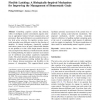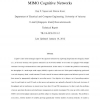69 search results - page 11 / 14 » The Element of Surprise in Timed Games |
COGCOM
2010
13 years 4 months ago
2010
Controlling cognitive systems like domestic robots or intelligent assistive environments requires striking an appropriate balance between responsiveness and persistence. Basic goal...
AIIDE
2008
13 years 9 months ago
2008
Artificial intelligence in games is typically used for creating player's opponents. Manual edition of intelligent behaviors for Non-Player Characters (NPCs) of games is a cum...
SIAMDM
2002
13 years 7 months ago
2002
A quorum system is a collection of sets (quorums) every two of which intersect. Quorum systems have been used for many applications in the area of distributed systems, including mu...
INFOCOM
2012
IEEE
11 years 10 months ago
2012
IEEE
Cognitive radio (CR) techniques improve the spectrum utilization by exploiting temporarily-free frequency bands (i.e., in the time domain). The spectrum utilization can be boosted...
DCC
2008
IEEE
14 years 7 months ago
2008
IEEE
The Range Minimum Query (RMQ) Problem is to preprocess an array A of length n in O(n) time such that subsequent on-line queries asking for the position of a minimal element between...


